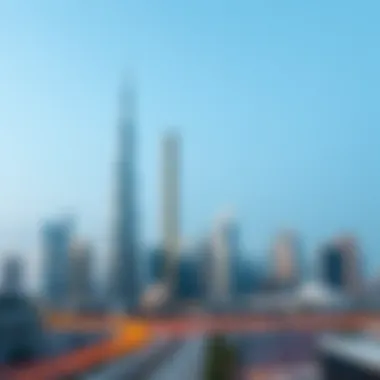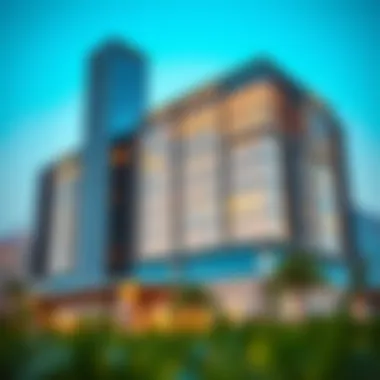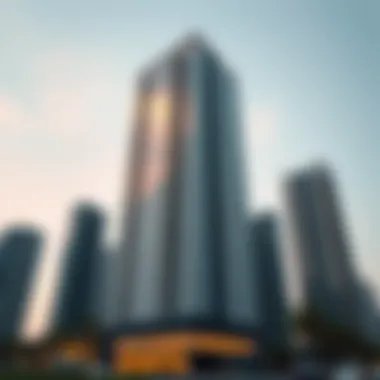Finding Dubai's Leading Real Estate Developers


Intro
The vibrant and rapidly evolving landscape of Dubai's real estate market indeed presents a kaleidoscope of opportunities. With a bolstering economy, it's no wonder that prospective investors and developers are flocking to this city. Understanding the nuances that distinguish the best developers is critical for anyone looking to navigate this bustling environment. Evaluating a developer extends beyond inspecting their portfolio; it involves delving into the realm of innovation, reputation, and contribution to the city’s architectural tapestry.
This article aims to provide a comprehensive guide, detailing insights from trends to recommendations, useful for buyers, sellers, agents, and developers alike.
Property Market Overview
Current Market Trends
The real estate market in Dubai has seen its fair share of fluctuations. Recently, there's been a notable shift towards sustainability and smart living. Developers are placing greater emphasis on integrating technology into their projects. Smart home features and eco-friendly designs are not just trends but becoming expectations among discerning buyers.
Understanding the following aspects can enrich your perspective:
- Demand for Luxury Properties: Buyers are increasingly leaning towards high-end properties that offer more than just walls. They seek amenities and lifestyle experiences that come with luxurious living.
- Emergence of Off-Plan Sales: Many developers offer attractive payment plans and promotions for off-plan properties, often making them an appealing investment choice.
- Resale Market Growth: The secondary market is gaining traction as owners look to capitalize on their investments.
Key Neighborhood Insights
When it comes to selecting the right developer, knowing the neighborhood is as crucial as understanding the developers themselves.
- Dubai Marina: A haven for luxury seekers, filled with waterfront properties. Developers here often invest in premium designs and high-end amenities to draw in the affluent clientele.
- Downtown Dubai: This area is often considered the heart of the city, boasting iconic structures like the Burj Khalifa. Developers focusing on this locale typically prioritize architectural innovation and invest significantly in cultural integrations.
- Dubai Hills Estate: Merging suburban grace with urban flair, this area showcases eco-friendly projects that often appeal to families seeking a balanced lifestyle.
Buying and Selling Guidelines
Essential Steps for Buyers
For those looking to buy property in Dubai, navigating the market can feel like trying to find a needle in a haystack. However, following a few key steps can streamline the process:
- Researching Developers: Thoroughly investigate prospective developers. Look into their track record, financial health, and previously completed projects.
- Inspecting Developments: Make it a point to visit ongoing projects and completed properties to gauge quality firsthand.
- Reviewing Contracts: Pay close attention to the terms and conditions laid out in the contracts. Consulting an attorney may save you from potential pitfalls.
- Understanding Market Rates: Familiarize yourself with market prices to ensure you’re making informed decisions while buying.
Tips for Sellers
Sellers must present their properties in the best light to attract potential buyers. Here are some handy tips:
- Market Analysis: Keep an eye on the current market trends to assess your property's valuation accurately.
- Enhancements: Minor renovations or staging can significantly boost appeal. A fresh coat of paint or sprucing up the garden can make a world of difference.
- Engaging a Real Estate Agent: Professionals can provide valuable insights and help navigate the complexities inherent in the selling process.
"Identifying the right developer is like choosing a partner; their reputation and portfolio can significantly influence the outcome of your investment."
Prologue to Dubai's Real Estate Landscape
The real estate landscape of Dubai isn't just a showcase of skyscrapers and luxurious villas; it's a complex tapestry woven from history, economic factors, and societal shifts. As an investor, buyer, or developer in this vibrant market, grasping the nuances of the local scene is paramount. This section lays the groundwork for understanding the significance of the Dubai property market, emphasizing the elements that make it compelling for investment.
Dubai has grown rapidly over the past few decades into a global hub for trade and tourism. The importance of this transformation cannot be overstated. The city has attracted a melting pot of cultures and nationalities, leading to a diverse property market that caters to various tastes and budgets. Developers in Dubai have responded to these changing dynamics, tailoring their projects to meet the demands of an ever-evolving clientele. They’ve push through boundaries, creating architectural marvels that not only redefine the city's skyline but also its economic prospects.
Historical Context
To truly appreciate the current state of Dubai's real estate market, one must take a step back and consider its historical roots.
- Foundational Years: Dubai's economy was originally based on fishing and pearl diving. But with the discovery of oil in the 1960s, everything changed. Wealth surged, leading to significant infrastructure development and the beginnings of the modern real estate landscape.
- Boom and Bust: The early 2000s saw a boom in construction, with grand projects sprouting like weeds. However, the global financial crisis of 2008 turned the tide, leading to a downturn. It was a tough love moment for the market, pushing developers to re-assess strategies and focus on sustainability and realistic expectations.
- Recovery and Growth: Post-2010, Dubai's real estate took a turn for the better. Major events like Dubai Expo 2020 (delayed but still impactful) reignited interest and investment in property. Many developers adapted by diversifying offerings and introducing innovative urban designs that respond to both challenge and opportunity.
Understanding this historical context is crucial for investors to develop informed strategies moving forward.
Current Market Trends
With a solid grip on history, we now pivot to what’s currently shaping the market.


- Luxury Remains King: High-end properties continue to attract both local and foreign buyers. Developments like Emaar's Burj Khalifa have become symbols of status, driving the preference for luxury in property.
- Sustainability Focus: More developers are embracing eco-friendliness. Projects are increasingly designed to be energy-efficient, aligning with Dubai's vision to be a leading green city. From solar panels to water conservation designs, sustainability isn’t just a trend; it's becoming expected.
- Smart Homes: The integration of technology in homes is no longer a luxury but a necessity. Consumers are looking for smart features that optimize living experiences, and developers are quickly learning to keep up.
Criteria for Evaluating Developers
In a bustling market like Dubai’s, where skyscrapers rise like monuments of ambition, discerning the best developers is critical for anyone looking to invest wisely. Evaluating developers goes beyond just glancing at glossy brochures. It requires a deep dive into a few essential criteria that can make or break your investment. The importance of these criteria cannot be overstated, particularly in a landscape marked by fierce competition and rapid changes. Here, we’ll explore the specific elements that investors should consider when assessing developers, outlining the benefits and considerations tied to these criteria.
Project Portfolio and Innovations
A developer’s project portfolio holds treasures of insights. It’s akin to a chef’s recipe book—what they’ve crafted before tells you a lot about what they might whip up next. A rich portfolio that features diverse projects reflects a developer’s adaptability and innovation. Look for standout features such as:
- Design creativity: Unique architectural styles can significantly enhance property value.
- Variety of projects: Developers who work on residential, commercial, and luxury offerings can indicate robust versatility.
- Quality over quantity: It’s better to have a few high-quality developments than a mountain of mediocre ones.
Moreover, innovation is the name of the game. Developers that continuously push the envelope with smart technology or sustainability features lead the way in modern property development. Having examples—like Emaar Properties with their use of cutting-edge design in the Dubai Marina—illustrates what to look for.
Market Reputation and Client Reviews
Next up is how a developer is perceived within the industry and by their clientele. This is not just about being well-liked; it plays a direct role in investment safety. A solid market reputation serves as a safety net for investors, while negative client reviews can serve as red flags. Here’s what to ponder:
- Client satisfaction: Seek testimonials and reviews from past buyers. Satisfied clients often mean reliable developers.
- Industry awards: Recognition from credible sources can signal quality and trustworthiness. For instance, accolades highlighting a developer’s commitment to excellence demonstrate their leadership in the sector.
- Social media presence: Nowadays, the online reputation is crucial. Check platforms where clients discuss experiences; Twitter and Facebook can be quite revealing.
As a golden rule, always do your due diligence. Just like an inexperienced buyer can sink money into a property without a second thought, it’s wise to remain vigilant about who you trust with your investments.
Sustainability and Eco-Friendliness
In the wake of growing environmental concerns, sustainability has become a buzzword not just in lifestyle choices but also in property development. Developers with a keen focus on eco-friendliness don’t just comply with regulations; they lead by example. Considerations for this aspect include:
- Use of green materials: Look for developments that integrate sustainable building materials. This is often an early indicator of a forward-thinking developer.
- Energy-efficient designs: Features like solar panels and efficient heating/cooling systems not only enhance the livability of a project but also reduce operating costs for residents.
- Community planning: Developers who prioritize community layout like parks and pedestrian-friendly spaces showcase a broader environmental strategy.
Investors are increasingly looking for developments that are not just buildings but rather smart, sustainable living spaces. Having builders who emphasize these practices can not only guarantee a better living experience but also lead to higher resale values in the years to come.
"The sustainable approach in property development doesn’t only save the environment; it often equivalently increases the market value of a project over time—invest wisely!"
In summary, evaluating developers in Dubai requires a careful balance of assessing their project history, client satisfaction, and sustainability practices. Each of these facets contributes significantly to an informed investment decision that can culminate in both personal satisfaction and financial success.
Prominent Developers in Dubai
Identifying the prominent developers in Dubai is crucial for anyone looking to make informed decisions in the fast-paced real estate market. These developers not only shape the skyline but also influence residential trends and commercial viability. By understanding the key players, investors can tailor their strategies effectively and align their choices with market demands and buyer preferences.
Emaar Properties
Key Projects
Emaar Properties stands out with its portfolio of high-impact projects, including the iconic Burj Khalifa and the expansive Dubai Mall. These developments are not just architectural feats; they symbolize Dubai's ambition and its capacity for innovation. The luxurious design and strategic locations of these projects make them attractive entries in any investment portfolio. The luxury residences and retail spaces created by Emaar embody the lifestyle that many desire in Dubai. However, while the allure of luxury draws many, the high entry price points may deter first-time investors.
Market Influence
The influence of Emaar on the market is undeniable, as its projects often set the benchmark for quality and luxury. Developers often look to Emaar as a model for success, which speaks volumes about their market positioning. Companies wanting to distinguish themselves frequently adapt Emaar’s standards of quality and customer engagement. However, potential downsides include the risk of becoming too reliant on a singular market trend, which could lead to saturation in the luxury market and reduced diversity in offerings.
Damac Properties
Distinctive Offerings
Damac Properties prides itself on its unique offerings that cater to a variety of tastes and budgets. The company is famous for its themed developments, such as the Trump International Golf Club Dubai, which creates an experiential lifestyle that appeals to affluent buyers. Its adaptability to changing market demands has made it a favored choice among those looking for something a bit out of the ordinary. However, the challenge here is striking a balance between themed luxury and more universal appeal, as niche markets can sometimes limit broader investor reach.
Client Base


Damac’s client base is quite varied, ranging from high-net-worth individuals to international buyers looking for investment opportunities. This diverse clientele brings various preferences to the table, allowing Damac to innovate continuously. Its upper-end demographic desires not only luxury but also exceptional services and amenities, propelling the company to meet ever-evolving expectations. However, the high expectations can occasionally create pressure, necessitating constant refinement in customer service strategies.
Nakheel Properties
Notable Developments
Nakheel Properties is perhaps best known for its transformational projects like the Palm Jumeirah. Its developments contribute significantly to Dubai’s tourism and hospitality sector. The ambition reflected in projects like these not only boosts the economy but also enhances Dubai’s reputation as a global hub. Investors see these large-scale ventures as pillars of long-term growth potential, but navigating the challenges of sustainability and community integration can be a balancing act for the developer.
Strategic Goals
Focusing on sustainable urban development, Nakheel aims to ensure that its projects enrich the community while remaining environmentally friendly. Their strategic initiatives involve collaboration with city planners and stakeholders to create spaces that are both livable and profitable. Understanding Nakheel's evolving goals is essential for investors, as they signify the developer's commitment to adapting to future demands. However, overreliance on mega-projects can also risk exposure to economic fluctuations that affect large developments.
Dubai Properties Group
Key Developments
Dubai Properties Group has carved a niche for itself through a variety of residential and commercial developments. Projects like the iconic Jumeirah Beach Residence illustrate the developer’s commitment to mixed-use spaces that enhance community life. The emphasis on creating cohesive neighborhoods makes these developments ideal for families and expatriates, signalling a focus on long-term residency rather than transient investments. Still, a potential pitfall is that this approach may slow down returns compared to faster-paced, high-rise options.
Community Impact
Community impact sits at the heart of Dubai Properties’ objectives. The developer focuses on building housing that integrates well with local amenities, parks, and community centers. This community-centric approach fosters a sense of belonging, which is attractive to international buyers. However, a high concentration on residential projects may limit opportunities in the commercial real estate sector, posing risks of reduced diversification.
Meraas
Recent Projects
Meraas is known for its bold designs and projects like City Walk, which aim to blend urban living with retail and entertainment. These recent projects are not only popular for their distinctive aesthetics but also serve as vibrant community hubs. Meraas’s approach attracts investors who value high-fidelity social experiences alongside real estate investment. However, the rapid development cycle can sometimes lead to questions around sustainability and the long-term viability of concepts.
Innovation in Design
Innovative design is a hallmark of Meraas, evident in their unique architectural choices and functional urban spaces. The focus on creating spaces that are not just livable but also engaging marks Meraas as a frontrunner in the real estate development landscape. This kind of creativity draws in a clientele that appreciates artistry as much as they do function. However, the drive for cutting-edge design can come at a cost, resulting in higher initial investment requirements and potentially limiting the mass market appeal.
In summary, exploring prominent developers in Dubai offers invaluable insights for investors, enhancing decision-making abilities in a complex market. Understanding the nuances of each firm enables better alignment with investment goals.
Investment Considerations
When diving into the realm of Dubai's real estate, understanding investment considerations is essential. As an investor, buyer, or even a developer, being informed about the factors that affect property investments can greatly influence your decisions. The Dubai market is ever-evolving, driven by economic shifts, emerging trends, and developments from prominent real estate developers. Being conscious of these aspects not only aids in making sound investment choices but also enhances the potential for lucrative returns.
Understanding Developer Financing
Developer financing is a crucial aspect for anyone looking to invest. It is important to have a grasp of how developers fund their projects. This knowledge allows investors to gauge the stability and sustainability of the projects they are interested in. Many developers in Dubai secure financing through a combination of personal capital, bank loans, and sometimes even foreign investments. If a developer relies heavily on loans, it may signify risks, particularly in fluctuating economic conditions.
- Questions to Ask:
- What is the ratio of debt to equity for the developer?
- How does the financing structure influence project delivery?
Understanding these factors can significantly impact your choice of developer. An investor should seek developers that demonstrate financial prudence and effective project handling.
Analyzing Return on Investment
When investing, one must always consider potential returns. Analyzing return on investment (ROI) in the context of Dubai real estate involves more than just looking at the purchase price versus selling price. It includes evaluating rental yields, property appreciation, and the duration of expected returns.
Here's a quick breakdown:
- Rental Yields: Within Dubai, certain areas yield higher rental returns. Understanding local market dynamics is key – do your homework to spot the best neighborhoods that offer these advantages.
- Appreciation Rates: Investigate historical trends in property value appreciation. Areas undergoing massive developments or infrastructural projects might show significant value increases over time.
- Timing of Sale: Estimate the ideal timeline for your investment. Short-term vs. long-term investments can yield vastly different returns. A savvy investor will amass all this information before putting down any money.


Remember: A well-researched investment strategy typically outshines instinctual decisions.
Timing and Market Entry Strategies
Identifying the right time to enter the market can be a game changer. In Dubai, timing can significantly influence property prices due to external factors like market sentiment, regulations, and global economic conditions.
Consider the following strategies:
- Stay Informed: Keep an eye on market reports and analytics from resources such as Dubai Land Department and Real Estate Regulatory Agency to ensure you're aware of market shifts.
- Leverage Seasonal Trends: Some months might reflect a decline in demand. Entering the market during these quieter periods can yield price benefits.
- Network Effectively: Connect with real estate agents and attend property expos, as they often provide the best insights and can present opportunities before they hit the general market.
Investing in real estate in Dubai can indeed be a fruitful endeavor, but it requires diligence and strategic thinking. Being aware of developer financing, understanding returns on investment, and honing your timing and entry strategies can place you in a favorable position within this competitive marketplace.
Challenges in the Dubai Real Estate Market
The challenges facing Dubai's real estate market are critical to understand for anyone involved in property investment. As one of the fastest-growing markets globally, it presents opportunities but also hurdles. Recognizing these obstacles helps investors, buyers, sellers, and developers navigate the landscape with greater acuity. Here, we delve into key challenges that every stakeholder should consider.
Economic Volatility
Dubai's economic landscape is known for its fluctuations. Rapid cycles of growth and downturn create a tough environment for property transactions. Investors must remain vigilant as external factors such as global oil prices or international economic trends significantly impact local real estate. Economic downturns can lead to decreased property demand, affecting rental income and overall asset value.
- Effects on Pricing: During uncertain times, prices can drop, which may benefit buyers but harm sellers.
- Investment Hesitancy: Volatile conditions often make potential investors cautious, adding another layer of difficulty in closing deals.
Understanding these economic waves can guide strategic investment decisions, ensuring that stakeholders are better prepared to weather the storm.
Regulatory Changes
The legislative environment in Dubai is ever-evolving. Changes in property laws can influence everything from property ownership to foreign investment rules. Being aware of these regulatory updates is paramount to making sound investment choices.
For instance, new laws might ease restrictions on foreign ownership, making real estate more attractive to global investors. Conversely, sudden regulatory changes can complicate existing contracts or projects already in development. Therefore, investors should:
- Stay informed about local government announcements and policies.
- Consult with legal advisors to understand the implications of any new regulations.
By keeping tabs on the changing regulatory framework, stakeholders can anticipate challenges and seize opportunities before they slip away.
Market Saturation
In recent years, the Dubai real estate market has observed a surge in developments, leading to concerns about saturation. An influx of units can outpace demand, resulting in a drop in property values. Buyers might find themselves with too many options, leading to diminished returns for developers and investors alike.
The impacts of market saturation can include:
- Decreased Pricing: With more supply than demand, prices may stagnate or decline, jeopardizing potential gains.
- Increased Competition: Developers might engage in price wars or promotional campaigns, further squeezing margins.
To navigate through saturation, investors must focus on unique factors that distinguish a property, such as location, amenities, or design, making it more appealing in a crowded marketplace.
End and Future Outlook
The conclusion and future outlook section is pivotal for understanding the overall trajectory of Dubai's real estate landscape. It encapsulates insights from previous sections, encouraging investors, buyers, and stakeholders to reflect on the findings surrounding the best developers in the region. This synthesis not only wraps up the key points discussed but also provides a roadmap for navigating future opportunities in a competitive market.
It’s crucial to recognize that the dynamic interplay of economic factors, regulatory influences, and emerging trends will continue to shape the Dubai real estate sector. Keeping an eye on these elements can inform investment decisions, ultimately contributing to sustainable profit generation and fostering long-term relationships with developers.
Emerging Trends
Firstly, let's discuss the emerging trends that are defining the current and future landscape of Dubai's real estate market. In recent years, several trends have come to light:
- Smart City Initiatives: The government is pushing for a smarter city by incorporating technology into infrastructure. Projects that embrace technology in building management systems are likely to be more sought after.
- Sustainable Development: Growing environmental awareness is prompting developers to focus on eco-friendly designs and sustainable materials. This trend not only appeals to socially conscious buyers but also aligns with global sustainability goals.
- Mixed-Use Developments: There is a noticeable shift towards mixed-use projects, which combine residential, commercial, and recreational spaces. These developments are becoming increasingly popular as they provide a holistic living experience.
- Shift to Suburban Living: Following the pandemic, many people are seeking larger homes away from the bustling city center. Developers who can adapt and provide attractive suburban projects might gain a competitive edge.
These trends signify a shift in buyer preferences and developer strategies. It’s essential for stakeholders to be aware of these developments as they may directly impact investment choices.
Predictions for Developer Success
Looking ahead, the predictions for developer success hinge on their ability to adapt to the aforementioned trends and respond to market demands effectively. Several factors can lead to increased success for developers:
- Innovation in Design: Developers that prioritize innovative designs and incorporate user-friendly features will likely capture the attention of discerning buyers. A unique aesthetic coupled with functional living spaces can be a winning combination.
- Partnerships and Collaborations: Success might also come from strategic alliances with technology providers, architects, and regional governments. Collaborations can enhance project visibility, efficacy, and appeal.
- Focus on Customer Experience: Developers who emphasize customer engagement and satisfaction—through streamlined buying processes and post-sale support—are positioned to foster loyalty and repeat business.
- Regulatory Acumen: Understanding and adapting to regulatory changes will be crucial. Developers who stay ahead of regulations can better navigate challenges, ensuring project fluidity and compliance.











